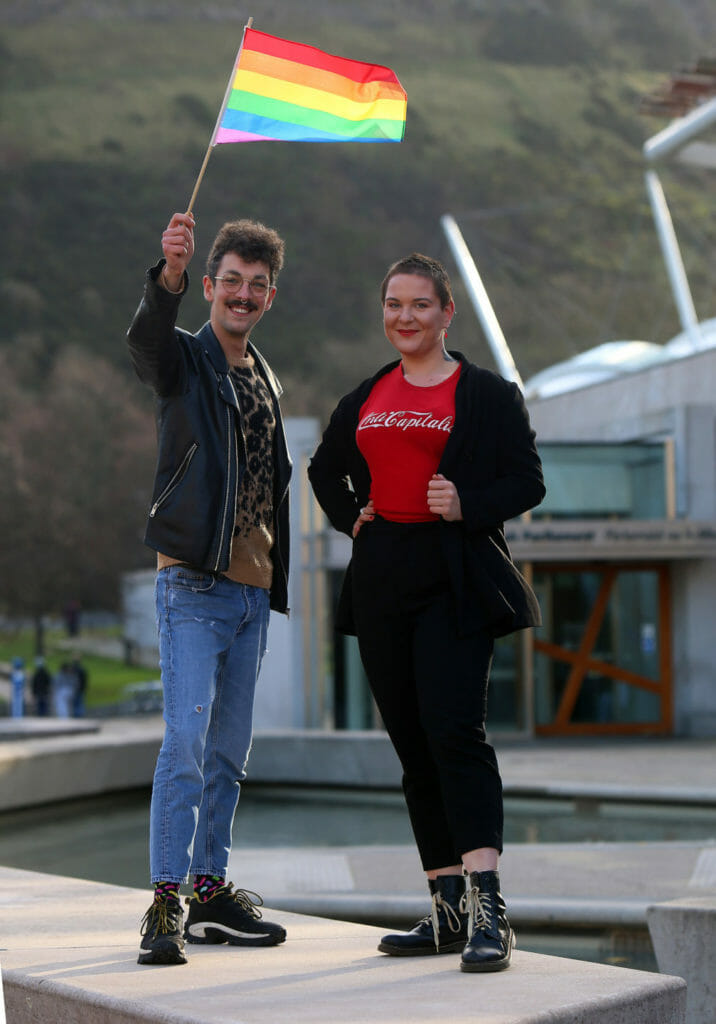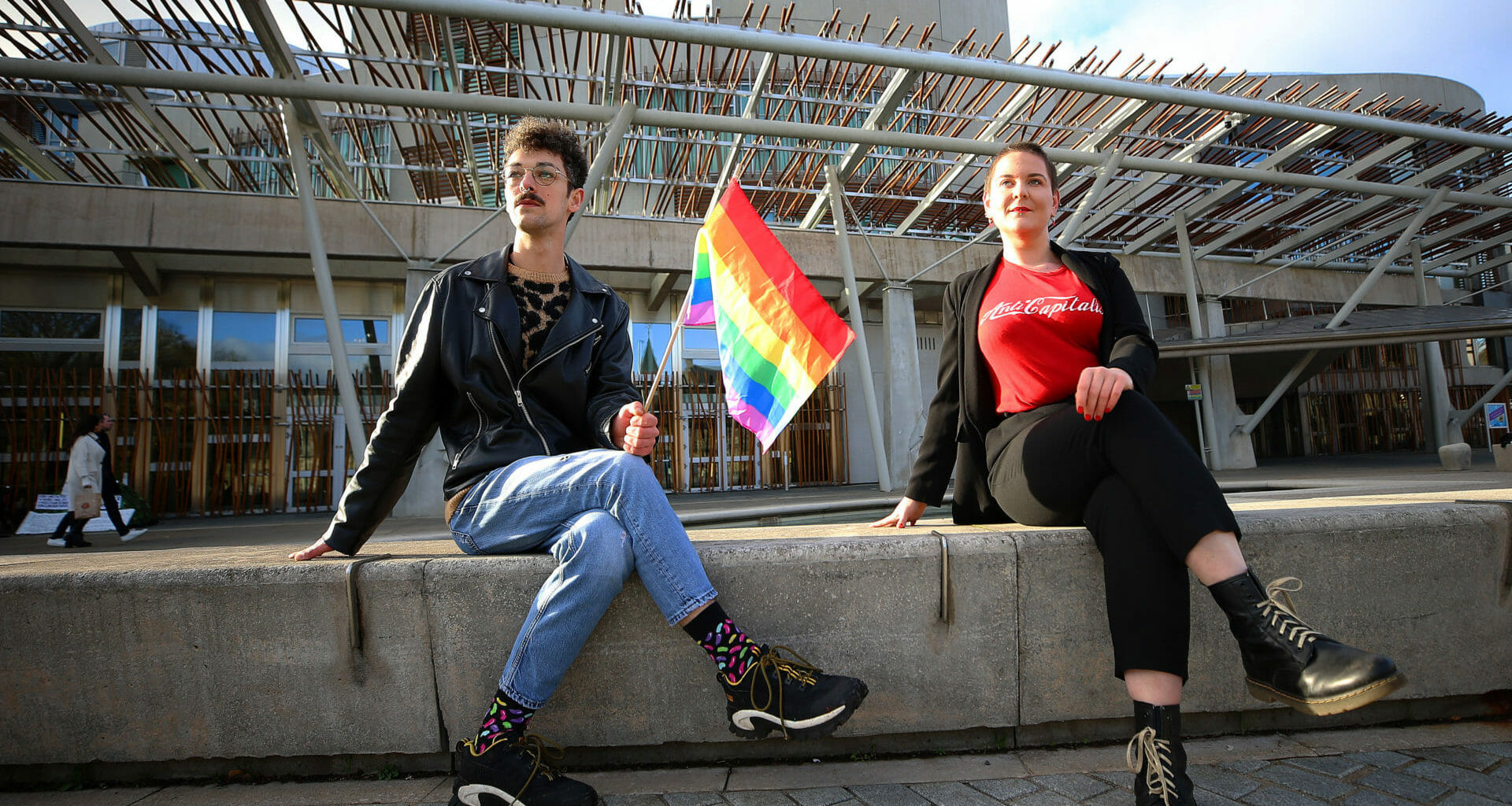Remigiusz Jabłecki had never organised a protest before.
During the four years he had lived in Scotland he had never felt much need to become involved in politics. Back in Poland something as inconsequential as the colour of his socks or the rips in his jeans could be understood, by some, as a political statement.
It was refreshing, then, to bask in the anonymity of a society that quietly validated his existence, to live in a nation where being gay was, for the most part, entirely accepted.
One morning this June, however, Remi decided he couldn’t be quiet anymore. “I just kind of…lost it,” he said. “I was just so sick of everything. It was accumulating in me. And then I read a statement from the Polish government that said LGBT ideology was worse than Communist ideology and the anger took over.”
Within a few days Remi had organised a protest outside of the Polish consulate in Edinburgh. Despite the short notice, the national lockdown, and unprecedented health crisis, people turned up.
They did chalk drawings on the pavement. They sang songs in the sun. And Remi held aloft a Polish flag as if reclaiming, for a moment, the country he felt had rejected him.
Poland’s hostile environment for its LGBT+ citizens has been a reality for years. But it was during the nation’s presidential elections in July that it really came to the fore.
Amidst a climate where in recent years Pride parades have been bombarded by people throwing bricks, physically assaulting marchers, and pronouncing homosexuals as paedophiles from loudspeakers affixed to vans, newly re-elected President Andrzej Duda has continually stoked the fire of this prejudice.
Duda and his Law and Justice Party (PiS) have sought to frame LGBT+ people not as fellow citizens but as insurgents promoting a foreign ideology. Some Polish towns have gone as far as to declare themselves ‘LGBT-free zones’. As a result many Poles have left the country of their birth and gone to countries where their sexuality will not make them a target, including Scotland.
For the past thirteen years Polish people have been the largest immigrant group in Scotland. According to the National Records of Scotland there are an estimated 97,000 Poles living in the country.
And from here – a place proud of its gay rights and voted top of the European LGBTI equality league in 2015 – Poles like Remi watch their own country legitimise hatred against them. Some are wondering if they will ever return.
So as Brexit looms and Poland continues to pass punitive laws against its most marginalised, how does it feel to be a gay Pole in Scotland? How do you fight for your rights from the other side of a continent? And what, if anything, can Scotland do to help?
When I first see Martyna on 24 October she is outside Edinburgh’s Polish consulate holding a megaphone, a rainbow flag draped over her arm as she bellows to the crowd: “You don’t fuck with Polish women, am I right?!”
I had spoken to Martyna a few days before on the phone about what turns out to be her prescient concern over the threat to abortion rights in Poland.
Under the Law and Justice party’s rule, the government has assumed direct control of the formerly independent body that appoints and disciplines judges. This has allowed the government to fill judicial spaces with supportive judges and threaten detractors with disciplinary proceedings.
A few days after we speak Poland’s constitutional tribunal rules that foetal defects should no longer be permitted as legal grounds for abortion. This means that, once passed by Parliament, around 98 per cent of the country’s legal abortions will now be criminalised.
Martyna moved to Edinburgh in April. After only a few months in the city she and a few others organised Edinburgh Queer Collective, an activist group that aims to shed light on the developing situation for LGBT+ people in Poland.
When you live as an LGBT person in Poland, when you go to Pride marches, you will hear people say that ‘fags should be gassed’. People in Scotland don’t understand how bad things really are.
Martyna
A few days after the court’s ruling, the quiet residential street in-front of the Polish consulate once again played host to protestors. This time, though, they had come in their hundreds. There are people with candles and coat hangers (a sickening symbol of backstreet abortions), or clutching signs that read: ‘THIS IS WAR’, ‘Poland = Gilead’ (the totalitarian patriarchal theocracy of the Handmaid’s Tale). Some placards look like they have had more than one airing.
As Martyna explains, there is a lot to protest about in Poland. She comes from Oswieçim, the industrial town formerly known, under Nazi occupation, as Auschwitz. “The situation right now reminds me of the 1930s,” she says. “When you live as an LGBT person in Poland, when you go to Pride marches, you will hear people say that ‘fags should be gassed’. People in Scotland don’t understand how bad things really are.”
Once, in Warsaw, Martyna was attacked by a man when she was coming out of a gay bar. “He pulled out a chunk of my hair. But when the police arrived they said that just pulling someone’s hair wasn’t enough to prosecute. They didn’t care. The next day the doctor told me I had pretty bad concussion.”
Poland is a deeply religious country, with over 87 per cent of the population identifying as Roman Catholic. Yet while Pope Francis has significantly softened the Church’s stance towards homosexuality, the attitude of the Law and Justice Party in Poland is aligned to a more traditional concept of Catholic values.

Martyna, however, makes a differentiation between the wider Catholic Church and the Polish version. “It is different,” she says. “ is a political entity, taking care of its own interests.
“I was raised Catholic, I was baptised. But last time I went back to Poland I ended up going to church with some friends and was forced to listen to a sermon about why gays were bad. Where is the biblical part of that? It is too political for me. Too hateful.”
One of the flagship policies that has helped maintain Duda’s popularity among the Catholic majority in Poland is the 500+ program. In an effort to boost the birth rate and decrease child poverty, the government now offers a monthly subsidy of 500 złoty (£103) for every child a family has. The government has also lowered the retirement age and promised to double the minimum wage by 2023. It is, Martyna tells me, the kind of populist policy making that keeps right-wing governments in power.
Pre-pandemic Poland also had one of the fastest growing economies in the EU. It would be easy to understand why many people thought that to be a good thing, wouldn’t it?
I hear Martyna sigh down the phone. “It is hard to believe good intentions when the same government giving out money is also the one forcing you to give birth to a deformed child, or inciting violence against you just because of who you love,” she says.
Even though I had left Poland I had carried with me so much trauma. And despite the fact I was in Edinburgh I just returned to these dark moments of my life by looking at what was happening on social media.
Remigiusz Jabłecki
Her view is shared by other Poles protesting in Edinburgh, Glasgow and beyond. Remigiusz and I meet at Greenwood cafe, Edinburgh’s new sober space for its queer community. In the basement of the pokey building we sit in a room surrounded by Remi’s paintings, placards and photographs as well as print-outs of speeches from the protest he organised in June.
“As LGBT rhetoric increased I felt that I just needed to do something,” he explains. “Even though I had left Poland I had carried with me so much trauma. And despite the fact I was in Edinburgh I just returned to these dark moments of my life by looking at what was happening on social media. And I just wanted to change it, to have a dialogue and examination of my past. That was actually really helpful.”
When I ask Remi if he feels safe as a gay man living in Scotland, he laughs and then apologizes. “Sorry that I am laughing but living in Scotland to me is, like, honestly a paradise.”
He’s aware that he may live within an Edinburgh bubble of tolerance, detached from potentially less accepting views of a more rural Scotland, but says that sense of safety was hard to find in Poland. “I always had to think: Who is around me? Is someone going to make a comment? Am I going to hear anything? Is someone going to shut a door in my face, or attack me?”
For many Poles like Remi, Scotland provides physical safety and, if necessary, recourse to the law if they ever find themselves the victim of a hate crime.
But with the EU struggling to exert its force on the Polish government to grant equality to people like Remi and Martyna, these Polish immigrants say they’ll no longer settle for a safe place to hide. They want help.
What form this help could take is less clear. Since 1994 Edinburgh and Krakow have continued to extend a partnership agreement that seeks to foster cooperation between the cities in areas such as education, social assistance, and culture.
But in July the equalities officer for UNISON wrote to several Edinburgh councillors asking them to cut all ties with the Polish city. Krakow is located within a region that has declared itself an LGBT-free zone, therefore UNISON states that severing this relationship sends a message of support to LGBT+ communities in Poland.
The following month the city’s Lord Provost wrote to the Mayor of Krakow to raise concerns about LGBT+ rights.
Martyna is not so sure these actions have been effective. “Removing this relationship punishes minorities, not the leading political authority” she says.
“While parts of Krakow can be dangerous for LGBT people, it is mainly a student town. It is the rural areas of Poland where the damage done by PiS politicians will be hardest to undo. Without outside influence what hope do we have of educating those people?”
Yet activists have legitimate cause to doubt whether the electorate back all the policy positions of the Law and Justice party.
In a poll from 2018, 70 per cent of respondents were against banning abortion in the case of foetal defects (even among Law and Justice voters, 40 per cent were against it).
Evidently a gap exists between the fervent conservatism of the Polish government and the views of the majority.
Remi, Martyna, and thousands of others hope that by making themselves visible they can provide optimism to a community in dire need of it.
In recent weeks more demonstrations in defence of Polish LGBT+ and abortion rights have taken place across Scotland, from big protests at the Scottish Parliament and Glasgow’s George Square to smaller marches in the city centres of Perth, Inverness and Dundee.
In Edinburgh Remi messages me a few weeks after we last met. “The Collective is growing,” he says.
Its latest initiative is to visit the consulate everyday to decorate the street in front with paints, hangers, yarn and candles.
The residents of Kinnear Road, where the consulate building sits amongst hedges and manicured topiaries, are not used to protesting queers filling their neighbourhood with colour. But if the determination of these two activists tells us anything, then they better get used to it.
Images by Gordon Terris (Herald&Times)
This article was published in tandem with the Sunday National.














